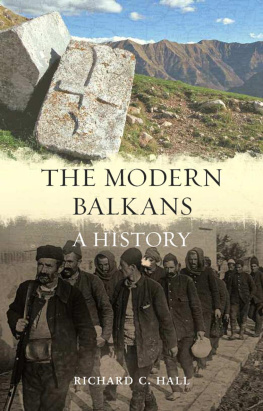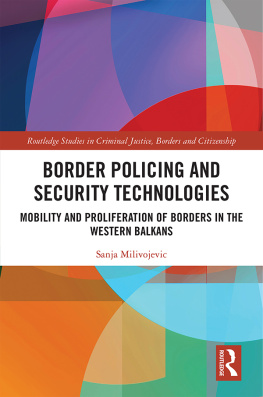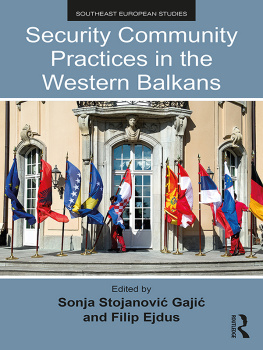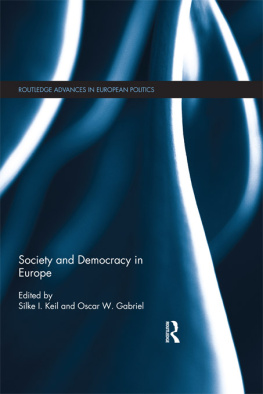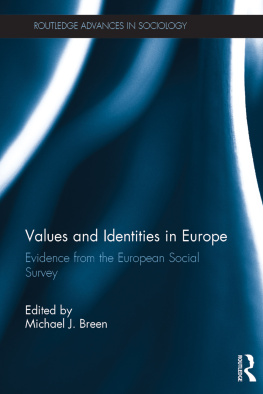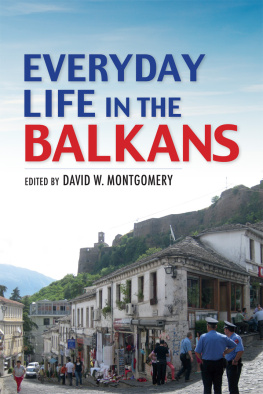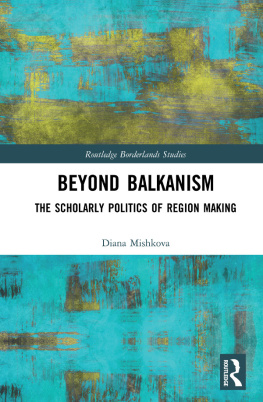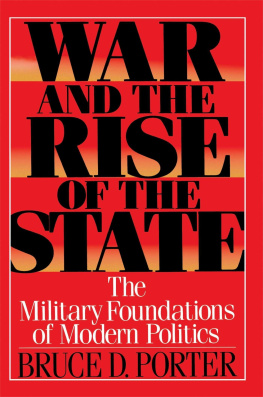THE AFTERMATH OF WAR
The Aftermath of War
Experiences and Social Attitudes in the Western Balkans
Edited by
KRISTEN RINGDAL AND ALBERT SIMKUS
The Norwegian University of Science and Technology (NTNU), Norway
First published 2012 by Ashgate Publishing
Published 2016 by Routledge
2 Park Square, Milton Park, Abingdon, Oxon OX14 4RN
711 Third Avenue, New York, NY 10017, USA
Routledge is an imprint of the Taylor & Francis Group, an informa business
Copyright Kristen Ringdal and Albert Simkus 2012
Kristen Ringdal and Albert Simkus have asserted their right under the Copyright, Designs and Patents Act, 1988, to be identified as the editors of this work.
All rights reserved. No part of this book may be reprinted or reproduced or utilised in any form or by any electronic, mechanical, or other means, now known or hereafter invented, including photocopying and recording, or in any information storage or retrieval system, without permission in writing from the publishers.
Notices:
Product or corporate names may be trademarks or registered trademarks, and are used only for identification and explanation without intent to infringe.
British Library Cataloguing in Publication Data
Ringdal, Kristen, 1948-
The aftermath of war : experiences and social attitudes in the Western Balkans.
1. War and societyFormer Yugoslav republics. 2. WarPsychological aspectsCase studies. 3. Former Yugoslav republicsSocial conditions. 4. Former Yugoslav republicsSocial conditionsPublic opinion. 5. Former Yugoslav republicsEthnic relations. 6. Former Yugoslav republicsEthnic relationsPublic opinion. 7. Public opinionFormer Yugoslav republics. 8. Social surveysFormer Yugoslav republics. I. Title II. Simkus, Albert A. (Albert Andrew)
949.703-dc23
Library of Congress Cataloging-in-Publication Data
Ringdal, Kristen, 1948-
The aftermath of war : experiences and social attitudes in the western Balkans / [edited] by Kristen Ringdal and Albert Simkus.
p. cm.
Includes bibliographical references and index.
ISBN 978-1-4094-5027-6 (hardback)
1. Balkan PeninsulaHistory1989- 2. War and societyBalkan Peninsula. 3. EthnicityBalkan Peninsula. I. Simkus, Albert A. (Albert Andrew) II. Title.
DR48.6.R56 2012
949.605dc23
2012037295
ISBN 9781409450276 (hbk)
Contents
Kristen Ringdal and Albert Simkus
Sabrina P. Ramet
Gerd Inger Ringdal and Kristen Ringdal
Gerd Inger Ringdal, Kristen Ringdal and Zan Strabac
Terje Andreas Eikemo and Kristen Ringdal
Terje Andreas Eikemo and Kristen Ringdal
Albert Simkus
Tanja Ellingsen, Kristen Ringdal, Albert Simkus and Zan Strabac
Zan Strabac
Kristen Ringdal, Albert Simkus and Ola Listhaug
Jelena Pei
Marija Brajdi Vukovi and Aleksandar tulhofer
Mladen Lazi and Slobodan Cveji
Maria Elena Sandovici and Ola Listhaug
Kristen Ringdal and Albert Simkus
Kristen Ringdal and Albert Simkus
List of Figures
List of Tables
Notes on Contributors
Slobodan Cveji (PhD) is Associate Professor of Economic Sociology and Social Statistics at the University of Belgrade, Faculty of Philosophy, Belgrade, Serbia.
Terje Andreas Eikemo (PhD) is Associate Professor of Sociology at the Norwegian University of Science and Technology (NTNU), Trondheim, Norway.
Tanja Ellingsen is Associate Professor of Political Science at the Norwegian University of Science and Technology (NTNU), Trondheim, Norway.
Mladen Lazi (PhD) is Professor of Sociology at the University of Belgrade, Faculty of Philosophy, Belgrade, Serbia.
Ola Listhaug (PhD) is Professor of Political Science at the Norwegian University of Science and Technology (NTNU), Trondheim, Norway, and Senior Associate of the Centre for the Study of Civil War, PRIO.
Jelena Pei is a doctoral student and Assistant Lecturer in Sociology at the University of Belgrade, Faculty of Philosophy, Belgrade, Serbia.
Sabrina P. Ramet (PhD) is Professor of Political Science at the Norwegian University of Science and Technology (NTNU), Trondheim, Norway, and Senior Associate of the Centre for the Study of Civil War, PRIO.
Gerd Inger Ringdal (PhD) is Professor of Health Psychology at the Norwegian University of Science and Technology (NTNU), Trondheim, Norway.
Kristen Ringdal (PhD) is Professor of Sociology at the Norwegian University of Science and Technology (NTNU), Trondheim, Norway.
Maria Elena Sandovici (PhD) is Assistant Professor of Political Science at Lamar University, Beaumont, USA.
Albert Simkus (PhD) is Professor of Sociology at the Norwegian University of Science and Technology (NTNU), Trondheim, Norway.
Zan Strabac (PhD) is Associate Professor at the Trondheim Business School, Trondheim, Norway.
Aleksandar tulhofer (PhD) is Professor of Sociology at the University of Zagreb, Zagreb, Croatia.
Marija Brajdi Vukovi (PhD) is a postdoctoral researcher at Institute for Social Research, Zagreb, Croatia.
Preface
This book is the main publication from the South-East European Social Survey Project (SEESSP). The project, originally named Contemporary Balkan Societies, started in 2001 with a grant from the Research Council of Norway within the South-Eastern Europe Programme. The main objective of the programme was, through collaboration with the countries in region, to contribute to the restructuring of these societies with the aim of securing democratic and economically sustainable development. Furthermore, the purpose of the program was to initiate, develop and fund collaboration within higher education and research between universities and research institutions in the region and corresponding Norwegian institutions. The grant (no. 144826/S30) from the South-Eastern Europe Programme was sufficient to finance surveys in seven countries and to enable students from the region to come to Norway for further studies in research methods.
The SEESSP was initiated by Albert Simkus in cooperation with researchers from Norwegian universities and Western Balkan universities. We are very grateful for the efforts made by our colleagues that made this complex project possible. We also want to thank the staffs of the survey agencies who carried out the fieldwork and the generous cooperation of the more than 21,000 respondents across the Western Balkans.
Finally, we want to thank Erik Friberg Ekrann for coding conflict data for Croatia, Bosnia-Herzegovina, Kosovo and Macedonia, and Terje Brevik, Hans Cats Myhre and Jonas Bernhardsson for assistance in digitalizing and preparing maps.
Kristen Ringdal and Albert Simkus
Trondheim, July 2012
Chapter 1
Introduction
Kristen Ringdal and Albert Simkus
The breakdown of the socialist regimes in East and Central Europe led to a resurgence of political and cultural ideas that had been suppressed by authoritarian control. Among the most important aspects of this resurgence were renewed claims for nationality states in formerly multiethnic states and a parallel rise in religious consciousness. Nationality questions can in principle be solved in several ways, but in the Socialist Federal Republic of Yugoslavia, the clash between demands for independence and Serbian nationalism culminated in the Wars of Yugoslav Succession with enormous human suffering.


